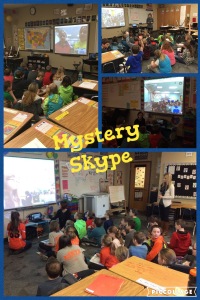A little over a week ago, a member of my PLN (Thanks, @korytellers!) threw out a tweet saying she was looking for a few more classes to participate in Mystery Skype. What is Mystery Skype? Basically, two teachers connect their classes digitally (most use Skype but some also use Google Hangouts). By asking a series of yes or no questions, the two classes have to determine where the other one is located. In this case, both classes were in the United States, so we had students narrow it down to the state the other group lived in, though I believe some narrow it down to the particular city.
So, since I don't have a class of students of my own, I sent an email to my teachers in my district. Within 24 hours, I had four teachers on board and ready to play! After figuring out some technical issues (the computer in the back of the room and the SmartBoard in the front of the room), I set up time to meet with each class ahead of time to teach them how to play.
I handed each student a labeled map of the United States with the regions of the United States labeled on the back. Then we brainstormed a list of questions we might ask to solve the mystery quickly. Early questions that didn't give us much information (such as, "Are you in Montana?") soon gave way to much more specific and inclusive questions (like "Are you in the  southeast region?". Students had to really think critically about the questions they asked in order to get the best information possible.
southeast region?". Students had to really think critically about the questions they asked in order to get the best information possible.
 southeast region?". Students had to really think critically about the questions they asked in order to get the best information possible.
southeast region?". Students had to really think critically about the questions they asked in order to get the best information possible.
To make sure they were really ready, we played a practice game with one half of the class challenging the other. Since we couldn't both use our home state, each group secretly chose a new state (and of course, chose some tiny state in New England to make it as difficult as possible for the other group). As they asked each question, they marked off states on their maps which were off the list of possibilities. They had a lot of fun working together to figure out the answers!
When it was time for the real thing, we took turns asking Mrs. Graham's classes yes or no questions to figure out where they were. And wouldn't you know it, but they were right here in Minnesota! Mrs. Graham's students told us a little bit about their school and community and we did the same as well. Both groups were absolutely floored to find out that both schools do coding in their technology/innovation classes AND both schools are building new primary schools right next door! What a coincidence!
I had a blast getting to work with these students and they really enjoyed solving the mystery. I can't wait to try it again with classes from another state! Thanks to Melissa Kisch, Jodi Burling, Erin Franson, and Michelle Ford for volunteering for this first round! If you are interested in connected with a class for a Mystery Skype, let me know!

